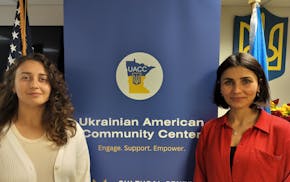Opinion editor's note: Strib Voices publishes a mix of guest commentaries online and in print each day. To contribute, click here.
•••
Shootings and other forms of community violence increased nationwide during and after the COVID-19 pandemic — including in the Twin Cities. When violence occurs, we rightly hail police officers, firefighters and paramedics as society's lifesavers. But we too often overlook the quiet work of those who prevent violence before it happens.
That work is known as Community Violence Intervention (CVI), and few people know what it entails. CVI organizations typically operate in specific neighborhoods — often communities that have suffered from decades of disinvestment and segregation.
Gun homicide rates among Black children and teens are 20 times higher than among their white peers. CVI workers often come from the very neighborhoods they serve, allowing them to build trust. Research shows that "trusted messengers" — individuals with shared lived experience — are essential to reaching high-risk populations.
CVI workers build relationships with individuals at the highest risk of violence, connect them to social services, help them reintegrate into the community and, quite simply, offer them a path forward. By interrupting cycles of violence and retribution, CVI workers help communities heal — often at great personal risk.
For CVI to succeed, continuity is essential. And continuity requires stable funding. But CVI funding is anything but stable.
Some Minneapolis CVI organizations recently lost funding amid a messy dispute over how CVI efforts should be managed. One example is the Metro Youth Diversion Center in the Cedar-Riverside neighborhood. In March, its director, Rashad Ahmed, was told that Cedar-Riverside was no longer considered a "violence hotspot" and that funding for their CVI work would be cut. The logic: The work had succeeded, so it was no longer needed. Ahmed calls this a "Band-Aid" approach and speaks of "pilot fatigue" — a community's weariness of short-term funding that disappears just as programs begin to take hold, setting progress back each time. Just days ago, four people were killed in a mass shooting just a few blocks south of Cedar-Riverside.
The debate over CVI in Minneapolis has included calls for improved financial accountability. We agree — accountability is essential for any publicly funded program. But is that the only issue? Directors of other CVI organizations point out that inconsistent funding undermines their work. For instance, Minneapolis CVI contracts lapsed at the end of 2023 and weren't renewed until April 2024, leaving a four-month citywide gap in services.
We spoke with Joseph Richardson, a nationally recognized CVI expert and professor of African American studies at the University of Maryland. He confirmed that unstable funding disrupts CVI efforts, creates job insecurity, lowers morale and adds stress. Moreover, a system based on annual contracts invites dysfunction — pitting organizations against each other in constant competition instead of uniting them around a shared goal: healing their communities.
As violence prevention researchers, we know CVI can work. Study after study confirms its effectiveness. One example is the Twin Cities-based Next Step program. Community violence often becomes a self-perpetuating cycle — between 20% and 45% of people treated for gunshot wounds are hospitalized again with reinjuries. Among Next Step participants, the rehospitalization rate is below 5%.
If we continue to interrupt and defund this work, we will further harm the high-risk communities we claim to care about. We will also reinforce the same patterns of disinvestment that have caused generational harm.
CVI workers who aren't constantly worrying about their next paycheck — or being forced to compete with one another — can instead focus on what really matters: bringing healing to their communities.
Maggiy Emery is the executive director of Protect Minnesota. Patricia Jewett is an assistant professor at the University of Minnesota School of Public Health.

Rash: 'Between both worlds,' Ukrainians in Minnesota contribute to each
Brehm: Hennepin County Attorney Mary Moriarty is an embarrassment for Minnesota

